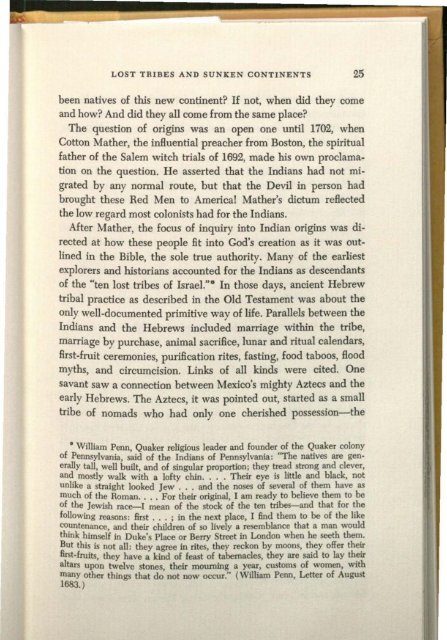You also want an ePaper? Increase the reach of your titles
YUMPU automatically turns print PDFs into web optimized ePapers that Google loves.
LOST TRIBES AND SUNKEN CONTINENTS 25<br />
been natives <strong>of</strong> this new continent? If not, when did <strong>the</strong>y come<br />
<strong>and</strong> how? And did <strong>the</strong>y all come from <strong>the</strong> same place?<br />
<strong>The</strong> question <strong>of</strong> origins was an open one until 1702, when<br />
Cotton Ma<strong>the</strong>r, <strong>the</strong> influential preacher from Boston, <strong>the</strong> spiritual<br />
fa<strong>the</strong>r <strong>of</strong> <strong>the</strong> Salem witch trials <strong>of</strong> 1692, made his own proclamation<br />
on <strong>the</strong> question. He asserted that <strong>the</strong> lndians had not migrated<br />
by any normal route, but that <strong>the</strong> Devil in person had<br />
brought <strong>the</strong>se Red Men to America I Ma<strong>the</strong>r's dictum reBected<br />
<strong>the</strong> low regard most colonists had for <strong>the</strong> <strong>Indian</strong>s.<br />
After Ma<strong>the</strong>r, <strong>the</strong> focus <strong>of</strong> inquiry into <strong>Indian</strong> origins was directed<br />
at how <strong>the</strong>se people fit into God's creation as it was outlined<br />
in <strong>the</strong> Bible, <strong>the</strong> sole true authority. <strong>Man</strong>y <strong>of</strong> <strong>the</strong> earliest<br />
explorers <strong>and</strong> historians accounted for <strong>the</strong> <strong>Indian</strong>s as descendants<br />
<strong>of</strong> <strong>the</strong> "ten lost tribes <strong>of</strong> Israel."· In those days, ancient Hebrew<br />
tribal practice as described in <strong>the</strong> Old Testament was about <strong>the</strong><br />
only well-documented primitive way <strong>of</strong> life. Parallels between <strong>the</strong><br />
<strong>Indian</strong>s <strong>and</strong> <strong>the</strong> Hebrews included marriage within <strong>the</strong> tribe,<br />
marriage by purchase, animal sacrifice, lunar <strong>and</strong> ritual calendars,<br />
first-fruit ceremonies, purification rites, fasting, food taboos, Bood<br />
myths, <strong>and</strong> circumcision. Links <strong>of</strong> all kinds were cited. One<br />
savant saw a connection between Mexico's mighty Aztecs <strong>and</strong> <strong>the</strong><br />
early Hebrews. <strong>The</strong> Aztecs, it was pOinted out, started as a small<br />
tribe <strong>of</strong> nomads who had only one cherished possession-<strong>the</strong><br />
• WUliam Penn, Quaker religious leader <strong>and</strong> founder <strong>of</strong> <strong>the</strong> Quaker colony<br />
<strong>of</strong> Pennsylvania, said <strong>of</strong> <strong>the</strong> <strong>Indian</strong>s <strong>of</strong> Pennsylvania: "<strong>The</strong> natives are gen·<br />
erally tall, well built, <strong>and</strong> <strong>of</strong> singular proportion; <strong>the</strong>y tread strong <strong>and</strong> clever,<br />
<strong>and</strong> mostly walk with a l<strong>of</strong>ty chin. . . . <strong>The</strong>ir eye is little <strong>and</strong> black, not<br />
unlike a straight looked Jew ... <strong>and</strong> <strong>the</strong> noses <strong>of</strong> several <strong>of</strong> <strong>the</strong>m have as<br />
much <strong>of</strong> <strong>the</strong> Roman . . .. For <strong>the</strong>ir original, I am ready to believe <strong>the</strong>m to be<br />
<strong>of</strong> <strong>the</strong> Jewish rare-I meao <strong>of</strong> <strong>the</strong> stock <strong>of</strong> <strong>the</strong> ten tribes-<strong>and</strong> that for <strong>the</strong><br />
follOwing reasons: first . . . ; in <strong>the</strong> n .. t place, I find <strong>the</strong>m to be <strong>of</strong> <strong>the</strong> like<br />
co~tenance. <strong>and</strong> <strong>the</strong>ir children <strong>of</strong> so lively a resemblance that a man would<br />
think himself in Duke's Place or BerrY Street in London when he seeth <strong>the</strong>m.<br />
But this is not all: <strong>the</strong>y agree in rites, <strong>the</strong>y reckon by moons, <strong>the</strong>y <strong>of</strong>fer <strong>the</strong>ir<br />
first-fruits, <strong>the</strong>y have a kind <strong>of</strong> feast <strong>of</strong> tabernacles, <strong>the</strong>y are said to lay <strong>the</strong>ir<br />
altars upon twelve stones, <strong>the</strong>ir mourning a year, customs <strong>of</strong> women, with<br />
many o<strong>the</strong>r things that do not now occur," (William Penn, Letter <strong>of</strong> August<br />
1683. )


















